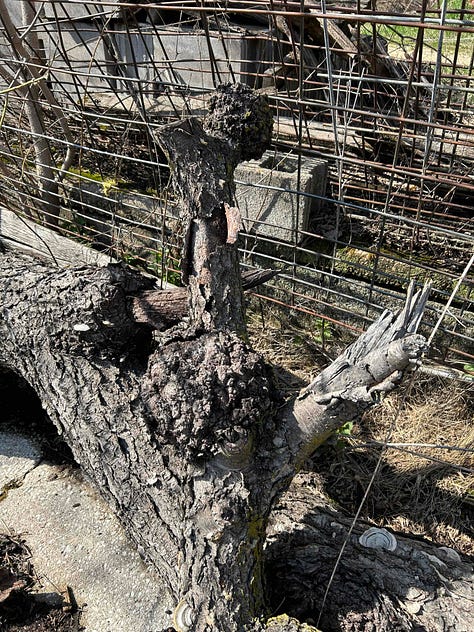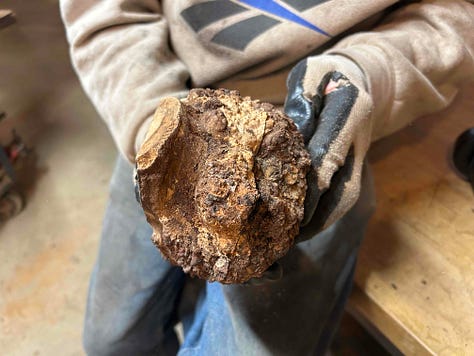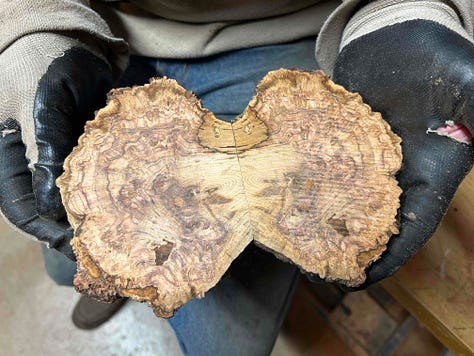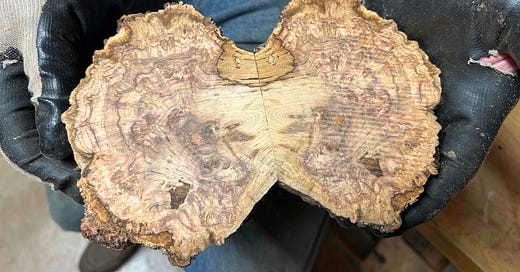Hello!



Dad and I spent some time cutting up a couple small Cherry burls this past week. These are like little treasure containers to me, all bulbous and bumpy on the outside, with wild figure on the inside. You don’t actually know what you’re going to get until you cut it open, and where you cut it changes how the grain will appear. You hope for something good but maybe all you get is oddly shaped firewood.
My essay is below. I’m returning to territory I’ve explored before—an essay by ceramicist Clary Illian—but I reread a few quotes from her book and wanted to write a bit more about it. I hope you find more gems and less firewood in the treasure containers of your life. ❤️
Handmade objects as antidote
“Handmade objects are an antidote to a soulless world flooded by products made with a minimum of effort for maximum profit and no reverence for natural materials,” writes Clary Illian in A Potter’s Workbook.
They are an antidote, I’d also say, to the idea that you’re not good enough until you have that next thing—material object, promotion, perfect 10-step plan to change X, Y, or Z about yourself, etc.—on your life list. To me it’s less about the handmade object itself and more about the process of creating it, though when we buy such items from others, we’re helping foster opportunities for them to also be the antidote to the “soulless world.”
Why bother with the trouble of learning to make something by hand? I’d argue one reason is the freedom such labor offers. Freedom to make something that fits into your own life just the way you want it to. Freedom from the choices of those with power and money to decide what your aesthetic should be. Freedom from the easy entertainment that numbs our senses and disconnects us from knowledge of our own capabilities.
I’ve been talking with people lately about their work, what they like about it, their challenges, what they’re thinking about for the future. I’m no Studs Terkel and am not going about this in a very scientific way. I’m struck, though, by the core themes that keep coming up.
Yesterday at my doctors office, the nurse who was helping my doctor talked about how she loved all the different things she gets to try and learn about, because the doctor brings her in to help with a variety of cases.
Earlier in the day I was talking with a photographer who shared that she’s been focused on one type of photography and is now stretching into new areas, connecting with small business owners and expanding her own repertoire in the process.
Each of the artisans I talked with in Winona, who freely admitted to the many challenges they regularly dealt with and how it was still worth it to be doing their own thing, be that glass blowing or making clothes or pottery.
Autonomy. Learning. Being valued.
We want to stretch and grow. Yet I feel like much of what we’re offered from the broader culture (society? I’m not sure how best to express this sentiment in a nuanced way, so I’ll just proceed wrecking-ball generalized) is cheap sustenance for a human nature born to be actively discovering and solving life’s puzzles.
Our culture seems to say that happiness eludes us by being just one item or like or follower away. Ever in the future, unknowable in the now. I don’t want to participate in that, either with the stories I tell or the items I make.
(Perhaps I need not worry: my methods are slow and the output is not yet masterful. My daily life is messy, filled with self-doubt. I imagine that the marketer who sells a thing or program to people, telling them they’ll be better off once they have it, either lacks such doubt or represses it with a strength I clearly can’t muster.)
“There can be no doubt: handmade pots are made by privileged people for privileged people,” Illian continues in A Potter’s Workbook.
“The potter’s privilege is not necessarily one of wealth or class but one of education and the freedom to succeed out of the mainstream. Potters can choose a life dedicated to pursuing excellence and individuation rather than a life given over to surviving. In a sense, they are privileged because they have the luxury of being idealistic. Although it is a struggle to make a living making pots, it is the struggle of any entrepreneur who wants to create a product or service with integrity.”
I appreciate her distinction between “surviving” and “struggling”—the life of a craftsperson can be a struggle financially or creatively or in other ways, but it’s different from surviving. Perhaps the struggles I write about in my essays are gentrified, as someone once told me. I’ve dwelled on that term, on its application to my own experiences, on the ways in which my life has been cleaned up and the ugliness removed.
Perhaps the shadow stretches into my wood shop itself, into the furniture and decor I make. And in a sense, this is true, for I have the freedom to work outside of the mainstream, as Illian points out above. But I don’t think you need to make a life out of it to benefit from doing some amount of work by hand.
There is harm and trouble brewing across the world, boiling over in too many places. We all find different ways to address this or cope through it. Connecting with those near us, whose lives intersect us locally, and finding ways to work together on the issues is one of the ways our family is muddling through.
What gives me the energy to do that is found in either my shop or my Dad’s, solving the at-times bedeviling puzzle of turning lumber into items that capture the eye and invite the hand. The patience, close attention, and frustration tolerance required to do any handmade work is a balm to the pain emanating all around.
“We cannot know the shape of the future,” writes Illian. “Indeed, we can hardly perceive the shape of the time in which we live. We can only dedicate ourselves to those activities we find meaningful and believe would be relevant in the best of all possible worlds.”







Is there anything you can't do??!!
Hey Tali- the little drawings you insert in your essays.....Are they ones you have drawn?